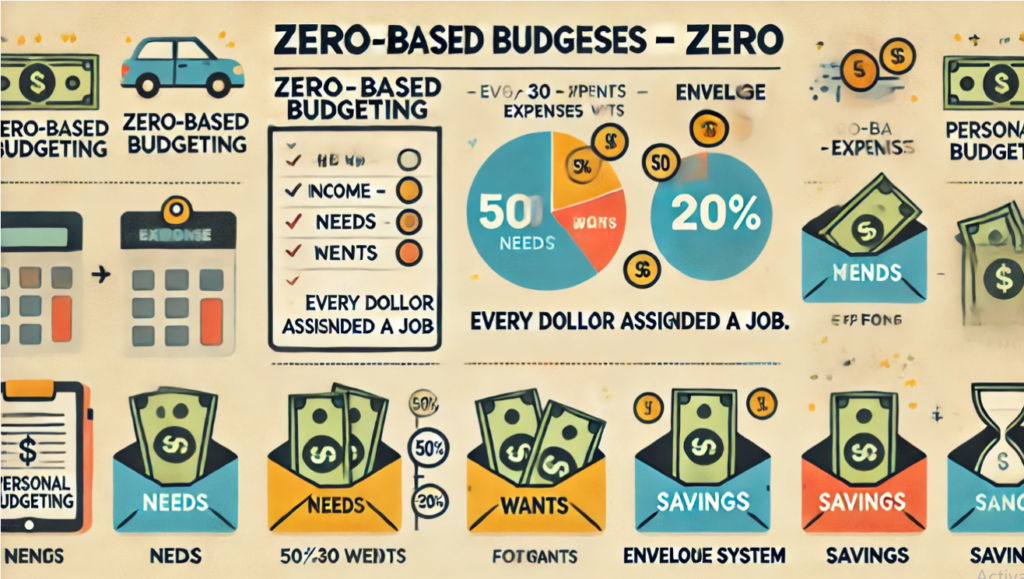
In 2025, organizing personal finances is more important than ever. With the ever-changing financial landscape, including challenges, trends, and emerging tools such as digital banking and AI-driven budgeting apps, it’s crucial to stay on top of your financial situation. In this guide, we will provide expert advice and actionable steps to help you improve your personal finance management in the coming year. Whether it’s adapting to new financial technologies or creating a budget that works for you, we’ll cover it all. Stay tuned for valuable tips and insights to help you take control of your finances in 2025.
Assessing Your Current Financial Situation
Reviewing income sources
When reviewing income sources, it’s important to take into account all potential sources of income. This includes your primary salary, any freelance work or side gigs you may have, as well as any passive income streams such as rental properties, investments, or royalties. By considering all of these sources, you can get a comprehensive understanding of your overall financial situation and make more informed decisions about your income and expenses.

Tracking expenses
Tracking expenses is a crucial part of managing your finances. Categorizing expenses into fixed and variable categories can help you understand where your money is going and make more informed decisions about your spending. Utilizing expense tracking apps and tools such as Mint or YNAB can streamline this process and provide valuable insights into your financial habits. These tools can help you create budgets, set financial goals, and keep a close eye on your spending habits, ultimately empowering you to make more informed financial decisions.
Evaluating debts
When evaluating debts, it’s important to consider the different types of debt you have, such as credit card debt, student loans, and mortgages. Each type of debt may have different interest rates and repayment terms, so it’s important to review these details for each one. Understanding the interest rates and repayment terms can help you prioritize which debts to pay off first and create a plan for managing and reducing your overall debt. It’s also important to consider how each debt impacts your overall financial well-being and long-term goals.
Net worth calculation
Calculating your net worth involves comparing your assets (like cash, investments, and property) with your liabilities (such as debts and mortgage). There are several tools available to help you track your net worth, such as Personal Capital and other financial management apps. These tools can provide a comprehensive overview of your financial situation and help you make informed decisions about your wealth management.
Setting Financial Goals for 2025
When setting financial goals for 2025, it’s important to consider both short-term and long-term goals. Short-term goals may include building an emergency fund, repaying debt, and starting a retirement savings plan, while long-term goals might involve investing for the future. Using the SMART goal framework can help create specific, measurable, achievable, relevant, and time-bound goals. For example, a specific goal could be saving a certain amount of money each month, with a measurable outcome of reaching a specific savings target by the end of the year. It’s also important to prioritize goals based on urgency and importance. This might involve breaking down goals into smaller, more manageable steps and working on the most critical ones first.

Building a Budgeting System
When it comes to building a budgeting system, there are several methods to choose from. The 50/30/20 rule, zero-based budgeting, and the envelope method are all popular options to consider. Once you’ve chosen a method, it’s important to create a monthly budget that allocates your income towards categories such as housing, savings, entertainment, and more. Setting up automatic transfers can help streamline the budgeting process by automatically paying bills and setting aside money for retirement, emergency funds, and other savings goals. It’s also important to regularly adjust your budget as life changes. Flexibility is key as your circumstances evolve, whether it’s due to a raise, new expenses, or other factors.

Saving and Building Emergency Funds
Emergency savings are crucial for financial stability and peace of mind. The recommended amount to save is 3-6 months of living expenses to cover unexpected costs such as medical emergencies, car repairs, or job loss. It’s important to set up a dedicated emergency fund account separate from your regular savings to avoid temptation to dip into it for non-emergencies. When choosing an account for your emergency fund, consider high-yield savings or money market accounts to maximize your returns. Building the fund can be done by automating transfers from your regular checking account, starting small and gradually increasing the amount over time. It’s important to use the emergency fund only for true emergencies, such as unexpected medical expenses or major car repairs.

Managing and Paying Off Debt
When it comes to managing and paying off debt, it’s important to first identify high-interest debts such as credit cards, payday loans, and high-interest personal loans. Once you’ve identified these debts, you can then consider different debt repayment strategies such as the snowball method, which focuses on paying off the smallest debts first, or the avalanche method, which prioritizes paying off the debts with the highest interest rates. Additionally, refinancing or consolidating debt may be options to consider. Debt consolidation loans and refinancing can both have their pros and cons, so it’s important to weigh these options carefully before making a decision. Understanding credit scores is also an important aspect of managing and paying off debt.

Investing for the Future
Investing for the future involves understanding the basics of various investment options such as stocks, bonds, mutual funds, ETFs, real estate, and more. It’s important to assess your risk tolerance and investment goals to determine what type of investments are right for you. Retirement accounts like 401(k), IRA, and Roth IRA are crucial for long-term financial security, and it’s important to choose the right account for your future needs. Building a diversified investment portfolio through asset allocation is essential for long-term growth. When in doubt, seeking professional advice from a financial advisor or wealth manager can help ensure you make informed investment decisions.

Leveraging Technology for Money Management
Leveraging technology for money management has never been easier. Digital banking and fintech tools like Chime, Venmo, and PayPal allow for seamless transactions and budgeting. AI and automation have also made finance management more efficient, with smart savings apps, robo-advisors, and AI-driven investment platforms. Additionally, there are tools available for tracking subscriptions and recurring payments, such as Truebill and Trim. And for those looking to expand their financial knowledge, there are plenty of online resources including blogs, podcasts, and online courses to stay informed on financial trends. With these technological advancements, managing your money has never been more accessible and convenient.

Protecting Your Financial Future
It is important to protect your financial future by considering various aspects of insurance coverage such as health, life, disability, and property insurance. Estate planning, including wills, trusts, and asset distribution, is also crucial for ensuring your assets are protected. Additionally, tax planning is essential for optimizing tax strategies and deductions, especially in 2025. Lastly, fraud protection measures are important to safeguard personal information and avoid falling victim to financial scams. By considering these factors, you can better protect your financial future.

Maintaining Financial Discipline and Accountability
Tracking progress toward goals
It’s important to regularly track progress toward your financial goals. Setting up monthly or quarterly check-ins can help you assess your financial health, identify any areas that need improvement, and make adjustments as needed to stay on track. This can also help you stay motivated and focused on achieving your goals.

Creating healthy financial habits
Creating healthy financial habits is essential for long-term financial stability. One way to do this is by regularly saving a portion of your income, even if it’s just a small amount each month. It’s also important to review your financial statements regularly to track your spending and identify areas where you can cut back. Limiting impulse purchases and sticking to a budget can also help you develop good financial habits and avoid unnecessary debt. By implementing these practices, you can work towards building a strong financial foundation for your future.
Finding a support system
Finding a support system for your financial journey is crucial for staying on track and reaching your goals. Joining financial communities, finding an accountability partner, or hiring a financial coach can provide the guidance and support you need to make informed decisions and stay motivated. These resources can offer valuable insights, encouragement, and accountability as you work towards achieving financial stability and success.
Conclusion
It’s crucial to recognize the importance of consistent effort when it comes to organizing finances. It’s not a one-time task, but a continual process that requires ongoing attention and dedication. As we head into 2025, it’s essential to stay flexible, adapt to changes, and commit to our financial goals in order to achieve success. I encourage you to take the first steps towards better financial health this year. Remember, small actions can lead to big results.














